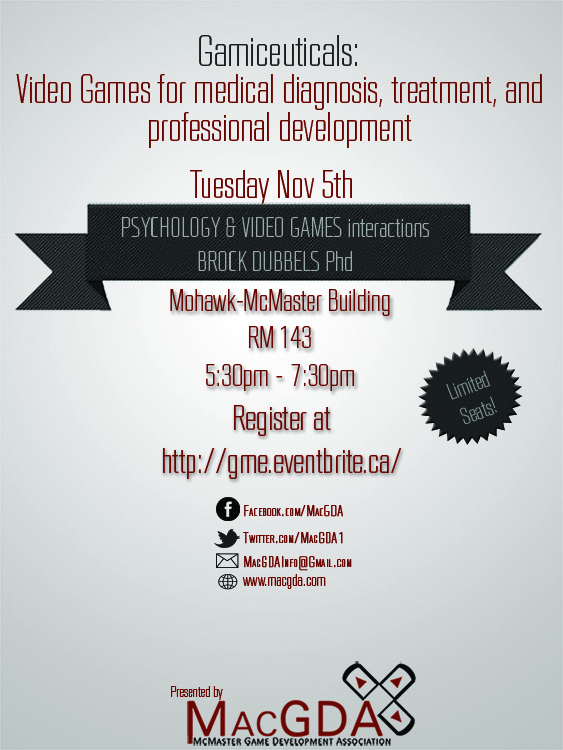Can UX research take a game that is not fun, and make it more fun?
CFP: UX — What is User Experience in Video Games?
The purpose of this special issue is to investigate the nature of video game UX.
ISO 9241-210[1] defines user experience as “a person’s perceptions and responses that result from the use or anticipated use of a product, system or service”. According to the ISO definition, user experience includes all the users’ emotions, beliefs, preferences, perceptions, physical and psychological responses, behaviors and accomplishments that occur before, during and after use. The ISO also list three factors that influence user experience: system, user and the context of use.
In this issue we hope to present practitioners and academic perspectives through presenting a broad range of user experience evaluation methods and concepts; application of various user experience evaluation methods; how UX fits into video game development cycle; methods of evaluating user experience during game play and after; and social play.
Authors are invited to submit manuscripts that
- Present empirical findings on UX in game development
- Push the theoretical knowledge of UX
- Conduct meta-analyses of existing research on UX
- Answer specific questions such as:
- Case studies, worked examples, empirical and phenomenological, application of psychological and humanist approaches?
- Field research
- Universal Access
- Face to face interviewing
- Creation of user tests
- Gathering and organizing statistics
- Define Audience
- User scenarios
- Creating Personas
- Product design
- Feature writing
- Requirement writing
- Content surveys
- Graphic Arts
- Interaction design
- Information architecture
- Process flows
- Usability
- Prototype development
- Interface layout and design
- Wire frames
- Visual design
- Taxonomy and terminology creation
- Copywriting
- Working with programmers and SMEs
- Brainstorm and managing scope (requirement) creep
- Design and UX culture
- What is the difference between user experience and usability?
- How does UX research extend beyond examination of the UI? Should we differentiate pragmatic and hedonic aspects of the game?
- Who is a User Experience researcher, what do they do, and how does one become one?
- What are the methodologies?
Potential authors are encouraged to contact Brock Dubbels (Dubbels@mcmaster.ca) to ask about the appropriateness of their topic.
Deadline for Submission January 2014.
Authors should submit their manuscripts to the submission system using the following link:
http://www.igi-global.com/authorseditors/titlesubmission/newproject.aspx
(Please note authors will need to create a member profile in order to upload a manuscript.)
Manuscripts should be submitted in APA format.
They will typically be 5000-8000 words in length.
Full submission guidelines can be found at: http://www.igi-global.com/journals/guidelines-for-submission.aspx
Mission – IJGCMS is a peer-reviewed, international journal devoted to the theoretical and empirical understanding of electronic games and computer-mediated simulations. IJGCMS publishes research articles, theoretical critiques, and book reviews related to the development and evaluation of games and computer-mediated simulations. One main goal of this peer-reviewed, international journal is to promote a deep conceptual and empirical understanding of the roles of electronic games and computer-mediated simulations across multiple disciplines. A second goal is to help build a significant bridge between research and practice on electronic gaming and simulations, supporting the work of researchers, practitioners, and policymakers.
Gamiceuticals: Video Games for medical diagnosis, treatment,
and professional development
Should games and play be used to diagnose or treat a medical condition? Can video games provide professional development for health professionals? To gather medical data? To provide adherence and behavioral change? Or even become a part of our productivity at work? In this presentation psychological research will be presented to make a case for how games are currently, and potentially, can be used in the eHealth and medical sector.
Join MacGDA for a talk with Brock Dubbels on issues related to games, health, and psychology.
 Sign up at http://gme.eventbrite.ca/
Sign up at http://gme.eventbrite.ca/
Brock Dubbels is an experimental psychologist at the G-Scale Game development and testing laboratory at McMaster University in Hamilton, Ontario. His appointment includes work in the Dept. of Computing and Software (G-Scale) and the McMaster Research Libraries. Brock specializes in games and software for knowledge and skill acquisition, eHealth, and clinical interventions.
Brock Dubbels has worked since 1999 as a professional in education and instructional design. His specialties include comprehension, problem solving, and game design. From these perspectives he designs face-to-face, virtual, and hybrid learning environments, exploring new technologies for assessment, delivering content, creating engagement with learners, and investigating ways people approach learning. He has worked as a Fulbright Scholar at the Norwegian Institute of Science and Technology; at Xerox PARC and Oracle, and as a research associate at the Center for Cognitive Science at the University of Minnesota. He teaches course work on games and cognition, and how learning research can improve game design for return on investment (ROI). He is also the founder and principal learning architect at www.vgalt.com for design, production, usability assessment and evaluation of learning systems and games.
Join the MacMaster Game Development Association: http://macgda.com/
Video Game Design for Children
McMaster Children and Youth University
Presented by: Dr. Brock Dubbels
Togo Salmon Hall, Rm 120, McMaster University
Video games can be a lot of fun. But, have you ever stopped to wonder how they are made? Dr. Dubbels will examine the different types of video games and explain how they’re developed and what makes them so entertaining. This event is intended for children 7 to 14 years of age.
Welcome to MCYU
MCYU offers free, monthly Saturday morning lectures for young students (7-14 years old), to spark their curiosity and expose them to the university environment.

 Our speakers present topics about science, arts, social science and more.
Our speakers present topics about science, arts, social science and more.
These fun, kid-friendly lectures provide
the opportunity to learn from a real professor,
find out what it feels like to be on campus,
and get a taste of what university life is like!
http://fhs.mcmaster.ca/mcyu/









